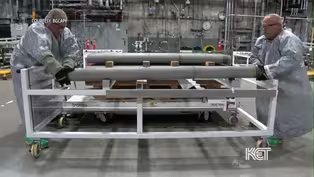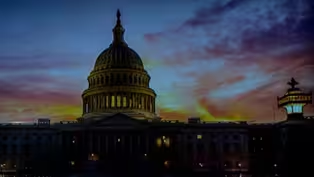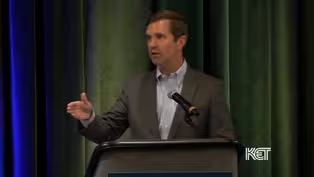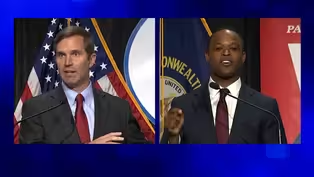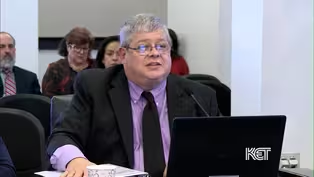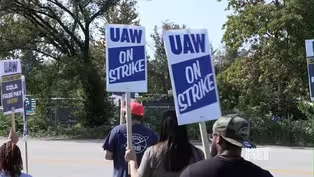
KY Judicial Commission On Mental Health
Clip: Season 2 Episode 96 | 6m 47sVideo has Closed Captions
Supreme Court Justice Lambert to discuss the KY Judicial Commission on Mental Health.
Renee Shaw sits down with Kentucky Supreme Court Justice Debra Lambert to discuss how the Kentucky Judicial Commission on Mental Health will use data being gathered at town hall meetings.
Problems playing video? | Closed Captioning Feedback
Problems playing video? | Closed Captioning Feedback
Kentucky Edition is a local public television program presented by KET

KY Judicial Commission On Mental Health
Clip: Season 2 Episode 96 | 6m 47sVideo has Closed Captions
Renee Shaw sits down with Kentucky Supreme Court Justice Debra Lambert to discuss how the Kentucky Judicial Commission on Mental Health will use data being gathered at town hall meetings.
Problems playing video? | Closed Captioning Feedback
How to Watch Kentucky Edition
Kentucky Edition is available to stream on pbs.org and the free PBS App, available on iPhone, Apple TV, Android TV, Android smartphones, Amazon Fire TV, Amazon Fire Tablet, Roku, Samsung Smart TV, and Vizio.
Providing Support for PBS.org
Learn Moreabout PBS online sponsorshipLast year, the Kentucky Supreme Court established the Kentucky Judicial Commission on Mental Health.
Renee Shaw recently sat down with Deputy Chief Justice Deborah Lambert about the commission, its goal and why it's needed.
The Commission is about 76 members.
We have been formed by our former chief justice, John Minton, and it was through his vision and a part of the national vision to make courts more understanding of how we interface with issues surrounding substance use disorder, mental illness and intellectual disabilities and disorder.
So that's what we're focusing on.
How can we improve those court touches, Right?
So is it is it correct to assume that those who suffer from mental health or substance use disorder or who deal with some type of disability, developmental or otherwise, are they interfacing more with the criminal justice system and legal system than others is disproportionate in some way?
Well, that's information we probably don't yet have, But when they do interface with us, we want to make that as positive and proper and experience as possible.
But we are, of course, part of our process, and any process these days is to gather data.
So we will be gathering that data.
We were very pleased that we were able to put on a very large summit last summer in Louisville, and even with short notice, we were able to gather over 1100 people in attendance at that summit and cross-train them.
As to all those three topics and had a wonderful summit to train that 1100 Kentuckians.
It was it was a wonderful experience.
So now you've been taking on these town hall meetings and you have a full list still yet to go.
What's the purpose of that and what are you hearing that has become quite informative?
Well, when we got home from the from the town hall, we were hearing good things about that.
The town hall attendees, though, were basically insiders, even though they were not just it was not just court personnel, it was police officers, it was school superintendents.
People outside our own judicial system were coming in to train with us and we were being trained by them as well.
But but still, it was the insiders, if you will, of the systems.
So we felt it was important for us to hear what is what are the roadblocks for the consumer, what are the roadblocks for our citizens in Kentucky?
Why is this issue so I'll say personally important to you, not just as your role as a deputy chief justice, but the personal significance it has for you.
Well, to give just a brief a little bit of background for me.
I'm a former family court judge and a former drug court judge.
And also just as a person who has lost people, friends and legal colleagues to suicide.
A few years ago, I was inspired to do something and actually take on the project of becoming a trained suicide prevention, a certified trained suicide prevention trainer.
And I did that through an organization called QPR.
QUESTION Persuade and refer.
And so for several years now, I've conducted free suicide prevention training.
So when former Chief Justice John Minton asked me if I would be willing to take on this task of leading the commission, it felt like a perfect fit.
It's mental health is a passion of mine and has been for quite some time.
What is the ultimate goal of the Mental Health Commission and the next steps that will come after these series of town halls that are dotted throughout the state?
Well, I think we we have a lot of goals, but I think we will take the data that we have gathered through this town hall.
We are gathering our data again, data is a very important thing to us as a as a large organization.
We will take the data and put that in a usable format.
And I'm not a data person, so I'm going down a road I'm not that comfortable with.
But we'll take we'll use that data to analyze our occurrences systems for improvement.
Our 76 member commission has subcommittees that work in different facets juvenile court, adult court, civil and criminal.
The projects that they're working on are based on the identified roadblocks.
So all that data will be shared with the proper committees.
So one of the things that they will be working on is where are the legislative changes needed?
At one of our early meetings, we discovered that a lady needed help with getting her driver's license restored after having had some mental health issues.
So that's one of the things that we learned.
And it was a particular quirk that we would have never heard about or thought of had we not had that town hall meeting.
So, you know, just being there and listening sometimes is so very important.
One of the one of the things that we're going to also do is create a position of spokesman because really with a judicial system, with our judicial ethics rules, which are necessary, you can't just call up a judge or a judge's office and talk with either the judge or the judge of staff about a case.
So if we create an honest ombudsman within the mental health commission, that person can help navigate the system a little bit better and might have been able to help the lady with a driver's license issue.
The commission is hosting a series of town halls around the state.
The next is scheduled for October 25th in Paducah.
You can learn more about the town halls at K, Why Courts dot gov.
Destruction Of The Chemical Weapon Stockpile
Video has Closed Captions
Clip: S2 Ep96 | 3m 51s | Sen. McConnell and others celebrate the destruction of the last US chemical weapon. (3m 51s)
GOP U.S. House Considers Rep. Scalise As Speaker
Video has Closed Captions
Clip: S2 Ep96 | 1m 1s | U.S. House Republicans privately vote to support Majority Leader Steve Scalise as Speaker. (1m 1s)
Kentucky's First FoodCorps Program
Video has Closed Captions
Clip: S2 Ep96 | 4m 8s | Perry County students are the first in Kentucky to take part in the FoodCorps program. (4m 8s)
KY Gov. Beshear Speaks To Business Leaders
Video has Closed Captions
Clip: S2 Ep96 | 1m 47s | Kentucky Gov. Beshear touted economic successes in KY during a Chamber of Commerce event. (1m 47s)
KY Gov. Candidates Debate In Paducah
Video has Closed Captions
Clip: S2 Ep96 | 2m 37s | Highlights from a debate between Governor Beshear and Attorney General Cameron. (2m 37s)
KY Social Security Benefits Set To Increase
Video has Closed Captions
Clip: S2 Ep96 | 40s | A look at how an increase in KY's social security benefits compares to the previous year. (40s)
New Allegations Against KY Youth Detention Center
Video has Closed Captions
Clip: S2 Ep96 | 1m 35s | New information surfaces about issues in the state's youth detention centers. (1m 35s)
UAW Strike Comes To Louisville
Video has Closed Captions
Clip: S2 Ep96 | 2m 3s | Workers from the KY Ford truck plant walked off the job as the United Auto Workers strike. (2m 3s)
Providing Support for PBS.org
Learn Moreabout PBS online sponsorship
- News and Public Affairs

Top journalists deliver compelling original analysis of the hour's headlines.

- News and Public Affairs

FRONTLINE is investigative journalism that questions, explains and changes our world.












Support for PBS provided by:
Kentucky Edition is a local public television program presented by KET
